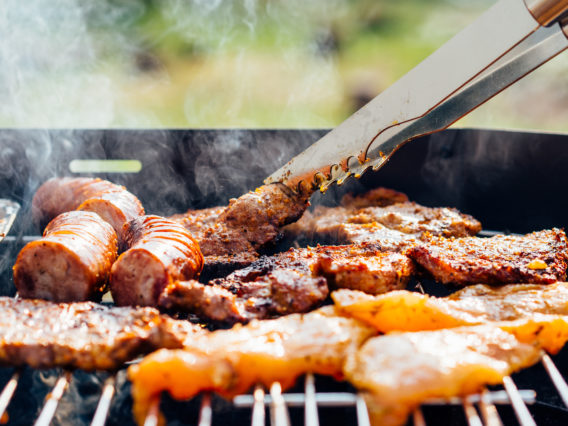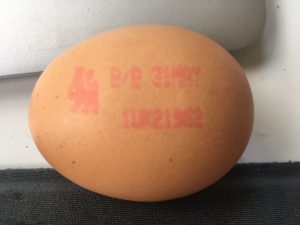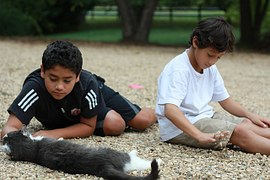
Foods to avoid during pregnancy include:
Uncooked or undercooked meat.Avoid any raw or undercooked meat or meat products. Cold-cured meats such as salami should be thoroughly cooked before you eat them. This is because raw and undercooked meats and eggs may contain bacteria and parasites such as salmonella and toxoplasmosis.
Some cheeses should also be avoided. Soft cheeses (unpasteurized, mould-ripened or blue) can contain bacteria such as listeria. Hard cheeses are safe to eat. Cheeses made with unpasteurized milk can be eaten if they have been cooked thoroughly first.
There is a food safety standard in the UK called the British Lion Code of Practice. Hens’ eggs produced in this way have a logo stamped on their shell, showing a red lion.

Lion Code hens eggs are considered very low risk for salmonella, and safe for pregnant women to eat partially cooked or even raw. That is – if the eggs are produced under the Lion Code, you can eat them lightly cooked in things like mousses, soft boiled eggs, lightly cooked omelettes, soufflés and fresh mayonnaise, or even raw.
If the eggs don’t have the Lion Code stamp, or if you’re not sure, make sure you eat them only when they are thoroughly cooked until the whites and yolks are solid. This is to prevent the risk of salmonella food poisoning which can lead to severe diarrhoea and vomiting.
If you’re in a cafe, and you don’t know whether the eggs are Lion Code – then eat them as if they weren’t – i.e. only if thoroughly cooked.
Non-hen eggs such as quail, goose and duck eggs should always be cooked thoroughly.
Some vitamin A is needed in the pregnancy diet – it’s important for the growth of embryonic babies, including the development of their hearts, eyes, bones, lungs, and kidneys, as well as their internal systems. It’s needed for the Mums as well – helping with tissue repair after birth, fighting infection, looking after your eyesight and more.
Vitamin A is a fat-soluble vitamin, which means it is stored in the liver and fat cells of the body. Too much vitamin A in the pregnancy diet can cause birth defects and/ or liver toxicity.
Foods such as liver and liver pâté contain excessively high levels of vitamin A and should be avoided during pregnancy. Supplements containing vitamin A should also be avoided. Note that Retin-A, used for certain skin conditions, contains retinol (a compound of vitamin A) and should be avoided – as should any other retinol-containing treatments.
Safe vitamin A, is available in two forms: beta-carotene (found in carrots, oranges, and sweet potatoes), helps skin cell production and immunity and is converted into a safe form of vitamin A by the body; and retinol (essential for eye development) is found in safe levels in dairy products and eggs.
When it comes to seafood, shark, marlin and swordfish should be avoided and tuna should be limited to no more than two steaks or four cans a week. Predatory fish store high levels of mercury in their muscles, which can be harmful to your developing baby’s brain.
You can have shellfish during your pregnancy if it has been cooked thoroughly. If you’re going to eat sushi make sure any raw fish has been frozen first.
In April 2022, uncooked smoked fish has been added to the list of foods to avoid in pregnancy, following several outbreaks of listeriosis in England and Scotland caused by smoked fish.
There are several bacteria and parasites that can cause illnesses that can harm an unborn baby.
Listeriosis
Listeriosis is caused by a bacteria called listeria. Most cases of listeriosis are caused by eating contaminated foods – usually unpasteurised milk, or dairy products made from unpasteurised milk. Listeriosis may also be caused by coming into contact with farm animals that are giving birth or have recently given birth. In April 2022, the UK Medical Director and Director of Maternity Services, added uncooked smoked fish to the list of foods that can potentially cause Listeriosis. Listeriosis may also be caused by coming into contact with farm animals that are giving birth or have recently given birth.
Salmonella poisoning
Salmonella is another group of bacteria that can cause food poisoning, which results in severe vomiting and diarrhoea. In order to prevent salmonella poisoning, it’s important to cook meat and non Lion-stamped eggs thoroughly and also have good hygiene techniques in the kitchen. Store fresh meat at the bottom of your fridge, and away from cooked meats. Don’t prepare raw meat on the counter, use a chopping board and wipe it clean with hot soapy water straight after use.
Toxoplasmosis

A warning to cat owners – toxoplasmosis is an infection caused by a tiny parasite that can live in cat poo or soil that has been contaminated by cat poo. If you have a cat, ideally ask someone else to empty the cat-litter tray every day – or if you have to do it yourself, wear washing up or gardening gloves. Scrub the tray with boiling water regularly. Wash your hands and the gloves thoroughly after each tray emptying. If your cat becomes sick, they may be infected, so let someone else look after them. Wear gardening gloves if you are digging in garden soil that could be contaminated. If you’re worried that you may have been exposed to the infection, or you have developed flu-like symptoms, ask your midwife about a blood test.
Furthermore:
If a pregnant woman catches toxoplasmosis, there is a risk of still-birth or miscarriage, and the unborn baby can develop water on the brain (hydrocephalus) or brain damage. It can also damage the baby’s eyes or other organs. This damage may not appear until childhood or adulthood.